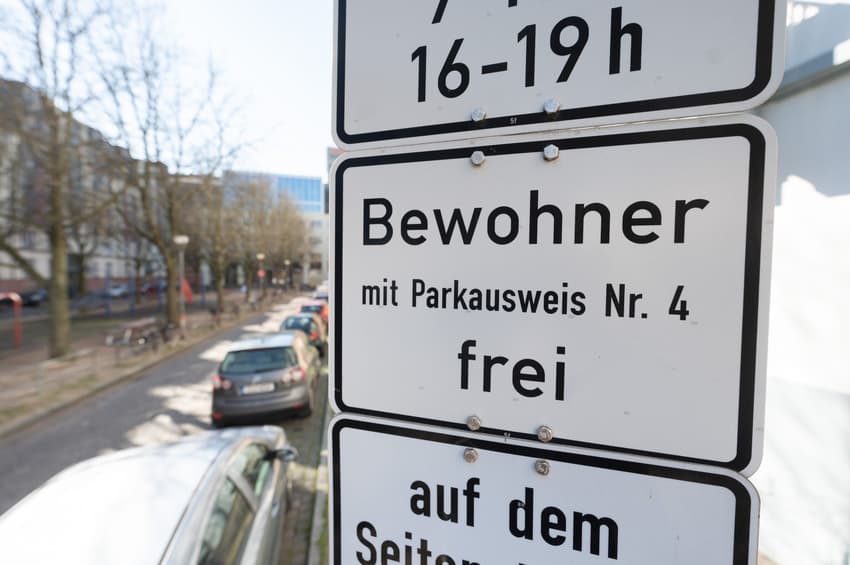German climate group calls for higher parking charges

The German Environmental Aid Association is urging local governments to implement significant hikes on parking fees for residents who park near their homes.
The association wants charges to be set at a rate of €1 per day - or €360 per year - to help relieve congestion in cities and encourage drivers to think twice about car ownership.
Currently, they argue, huge SUVs are allowed to park in many public places for just a few cents a day, and the low fees have slowed the transition to more eco-friendly forms of transport.
In many residential areas, especially in large cities, parking is only allowed with a resident's parking permit, which can cost as little as €10 per year. This allows people who live in the area to park for a minimal cost within walking distance of their home.
Compared to the cost of bus and train tickets, a fee of €360 per year for a parking permit would still be low, the DUH argues.
A survey by the environmental aid organisation showed that only five federal states allow municipalities to charge "reasonable fees" for residents' parking permits. Municipalities such as Erfurt, Cologne and Stuttgart are also permitted to impose higher fees but have so far decided not to.
In contrast, the environmental aid organisation sees regulations in Freiburg and Tübingen as models for residential parking. Freiburg charges car owners an average of €360 per year for ordinary cars, which goes up to €480 per year for SUVs and pick-ups.
Meanwhile, Tübingen charges €120 for ordinary cars and 50 percent higher (€180) for particularly large cars. The city's Green mayor, Boris Palmer, had originally wanted to set fees at €360 per year but was forced to back amid opposition from the city planning committee.
At the time, Palmer was accused of waging a "personal campaign against cars and their owners".

Tübingen Mayor Boris Palmer arrives at a press conference in torrential rain. Photo: picture alliance/dpa | Christoph Schmidt
READ ALSO: German city mayor plans to hike up parking charges by 600 percent
'Public space is scarce'
In mid-2020, the Bundestag and Bundesrat overturned a nationwide cap on residents' parking permits of €30.70 per year. Since then, states and municipalities have been able to regulate fees for urban neighbourhoods with a significant shortage of parking space.
"Public space is scarce and increasingly contested," says DUH Federal Director Jürgen Resch.
"Every year, the number of cars registered in Germany increases by half a million. At the same time, registered cars are getting longer, wider and heavier. Despite this, residents in most cities are allowed to deliver their huge SUVs and pick-ups to public spaces for only 8 cents a day."
This is only a fraction of the fees charged in many cities abroad, the DUH says.
The think-tank Agora Verkehrswende also thinks residents' parking in Germany is too cheap.
"The fees neither correspond to the costs nor the actual benefits," it says in a paper presented in January. A resident parking permit in Stockholm, for example, costs around €1,300 per year.
READ ALSO: Does German desire for transport efficiency trump environmental concerns?
States mull higher fees
As part of its campaign, the German Environmental Aid has distributed green, yellow and red cards to federal states that represent their parking policies.
Baden-Württemberg, Hesse, Lower Saxony, North Rhine-Westphalia and Thuringia all received a green card for allowing cities to charge reasonable fees for residents' parking.
Bavaria, Brandenburg, Saxony-Anhalt and Schleswig-Holstein received a red card since they haven't yet decided whether to give municipalities more options on parking charges.
According to the DUH, all other federal states - Berlin, Bremen, Mecklenburg-Western Pomerania, Rhineland-Palatinate, Saarland and Saxony - stated that they were planning a new parking fee regulation, but were currently still discussing the form it would take. This group of states were therefore given a yellow card.
In Hamburg, the regulation has already been adapted, but the DUH believes that the new rate of €65 per year is still too low to bring about meaningful change. Therefore, Hamburg also received a yellow card from the environmental aid organisation.
In Berlin, SPD, the Greens and Left Party agreed in their coalition agreement to increase the cost of resident parking permits to €10 per month by 2023 at the latest. Currently, a resident parking permit costs €10.20 per year.
Comments
See Also
The association wants charges to be set at a rate of €1 per day - or €360 per year - to help relieve congestion in cities and encourage drivers to think twice about car ownership.
Currently, they argue, huge SUVs are allowed to park in many public places for just a few cents a day, and the low fees have slowed the transition to more eco-friendly forms of transport.
In many residential areas, especially in large cities, parking is only allowed with a resident's parking permit, which can cost as little as €10 per year. This allows people who live in the area to park for a minimal cost within walking distance of their home.
Compared to the cost of bus and train tickets, a fee of €360 per year for a parking permit would still be low, the DUH argues.
A survey by the environmental aid organisation showed that only five federal states allow municipalities to charge "reasonable fees" for residents' parking permits. Municipalities such as Erfurt, Cologne and Stuttgart are also permitted to impose higher fees but have so far decided not to.
In contrast, the environmental aid organisation sees regulations in Freiburg and Tübingen as models for residential parking. Freiburg charges car owners an average of €360 per year for ordinary cars, which goes up to €480 per year for SUVs and pick-ups.
Meanwhile, Tübingen charges €120 for ordinary cars and 50 percent higher (€180) for particularly large cars. The city's Green mayor, Boris Palmer, had originally wanted to set fees at €360 per year but was forced to back amid opposition from the city planning committee.
At the time, Palmer was accused of waging a "personal campaign against cars and their owners".

READ ALSO: German city mayor plans to hike up parking charges by 600 percent
'Public space is scarce'
In mid-2020, the Bundestag and Bundesrat overturned a nationwide cap on residents' parking permits of €30.70 per year. Since then, states and municipalities have been able to regulate fees for urban neighbourhoods with a significant shortage of parking space.
"Public space is scarce and increasingly contested," says DUH Federal Director Jürgen Resch.
"Every year, the number of cars registered in Germany increases by half a million. At the same time, registered cars are getting longer, wider and heavier. Despite this, residents in most cities are allowed to deliver their huge SUVs and pick-ups to public spaces for only 8 cents a day."
This is only a fraction of the fees charged in many cities abroad, the DUH says.
The think-tank Agora Verkehrswende also thinks residents' parking in Germany is too cheap.
"The fees neither correspond to the costs nor the actual benefits," it says in a paper presented in January. A resident parking permit in Stockholm, for example, costs around €1,300 per year.
READ ALSO: Does German desire for transport efficiency trump environmental concerns?
States mull higher fees
As part of its campaign, the German Environmental Aid has distributed green, yellow and red cards to federal states that represent their parking policies.
Baden-Württemberg, Hesse, Lower Saxony, North Rhine-Westphalia and Thuringia all received a green card for allowing cities to charge reasonable fees for residents' parking.
Bavaria, Brandenburg, Saxony-Anhalt and Schleswig-Holstein received a red card since they haven't yet decided whether to give municipalities more options on parking charges.
According to the DUH, all other federal states - Berlin, Bremen, Mecklenburg-Western Pomerania, Rhineland-Palatinate, Saarland and Saxony - stated that they were planning a new parking fee regulation, but were currently still discussing the form it would take. This group of states were therefore given a yellow card.
In Hamburg, the regulation has already been adapted, but the DUH believes that the new rate of €65 per year is still too low to bring about meaningful change. Therefore, Hamburg also received a yellow card from the environmental aid organisation.
In Berlin, SPD, the Greens and Left Party agreed in their coalition agreement to increase the cost of resident parking permits to €10 per month by 2023 at the latest. Currently, a resident parking permit costs €10.20 per year.
Join the conversation in our comments section below. Share your own views and experience and if you have a question or suggestion for our journalists then email us at [email protected].
Please keep comments civil, constructive and on topic – and make sure to read our terms of use before getting involved.
Please log in here to leave a comment.